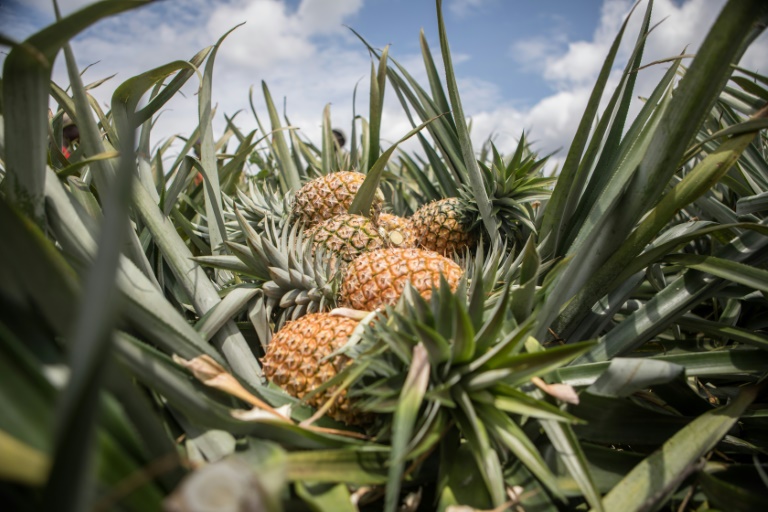EFF challenges budget process, calls for reset and VAT clarity
From his chair in the middle of a pile of pineapples, Jean-Xavier Satola supervises cutting and packaging, as Benin -- Africa's fourth-biggest exporter of the fruit -- starts trading again after an eight-month self-imposed absence.
The fields of Allada in southern Benin are a hive of activity as about 20 men, in trousers to protect them from the spiky leaves, pick the pineapples while women load them in baskets and carry them away on their heads.
The smooth, fat, yellow Cayenne variety of pineapples are washed, packed into cardboard boxes and put on a lorry. Eight hundred boxes will leave on a plane for Europe that evening.
Satola has been in the pineapple business for 30 years and as soon as he got the green light from the government was Benin’s first trader to resume exports.
“I’m at 46 tonnes since the start of the year. It’s less than half than in September 2016,” he said.
“Resumption is slow. Some of our European clients are hesitant. But we’re exporting more guaranteed quality now.”
In December, Benin’s government banned exports of the fruit after repeated warnings from the European Union about pineapples treated with the pesticide ethephon.
Ethephon is used to help a variety of crops ripen and speeds up colouring. In theory, the chemical stays on the skin of the fruit but if too much is sprayed, it can get inside.
The EU warnings came as ethephon residue was found to be higher than permitted levels.
But Satola, who heads Benin’s National Association of Pineapple Producers and Exporters, said growers were also responding to the taste of European consumers.
– ‘Respect market demands’ –
Producers “did any old thing” to make the outside of their pineapples the preferred yellow colour rather than the natural green, he said.
“They were adding doses of colourant pesticides after the rains or tipping in a lot after receiving an urgent order.”
Benin’s authorities imposed a voluntary export ban while it got its house in order.
A list of exporters was made, workers who administered the ethephon were trained and the state invested up to 300 million CFA francs ($536,000 460,000 euros) in equipment to analyse levels.
The country’s food standards agency ABSSA now carries out tests in the fields and at airports before shipping.

Benin banned the export of pineapples in December after repeated warnings from the European Union about the use of pesticide ethephon, which helps ripen and speeds up colouring
“These measures had to be taken,” said the head of ABSSA, Setondji Hossou. “We have to have quality produce and respect market demands.”
Hyacinthe Dossavi is an ABSSA inspector. Wearing boots, he makes his way through a field of Sugarloaf pineapples, which are also grown in West Africa, and takes samples for testing at the agency’s laboratory in Cotonou.
The crop was treated eight days ago. Normally, that should mean the ethephon has disappeared.
“If it’s below normal levels, we’ll allow the crop to be cut. If not, it’ll have to wait for a bit,” said Dossavi.
The exporters took some convincing. They play for high stakes with the perishable commodity: wait too long and the fruit risks being too ripe and impossible to sell.
It will then be sold on the local market but at a lower price.
– Bad habits –
For Ernest Ahokpe, who owns the field tested, it’s the price to pay.
“Europeans want coloured pineapples. We have to adapt because our competitors are doing it,” he said.
And those competitors are legion: Ghana, Cameroon, Ivory Coast and especially Costa Rica, the world’s number one exporter.
Before the voluntary ban, Benin had only five percent of the European pineapple market. In 2000, the country exported 500 tonnes of the fruit; in 2014, that had jumped to 4,000 tonnes.
As a result of the new regulations, only about 100 tonnes are expected to be exported this year — and then only untreated Sugarloaf pineapples.
‘Europeans want coloured pineapples. We have to adapt because our competitors are doing it,’ says pineapple field owner Ernest Ahokpe
They will still only be a marginal product at European supermarkets.
“My client told me it’s not a seller. White people buy based on the colour of the skin before the taste,” said pineapple grower Andre Dangbe, who has been exporting for three years.
“Here we like (pineapples) green. It’s how they’re meant to be and is sweet like that.”
At the offices of her company that exports pineapples to France for use in bottled fruit juice, agricultural engineer Bertille Guedegbe Marcos said the answer is better communication about Benin’s Sugarloaf pineapples.
“Europeans impose their habits on us but they’re bad ones,” she said.
Download our app